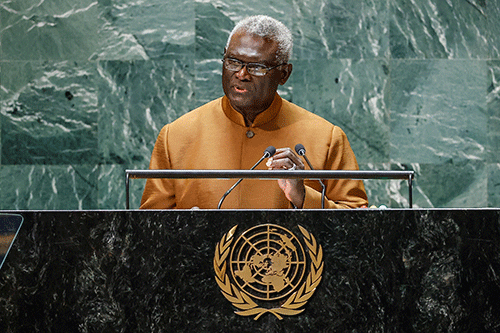HONIARA – Solomon Islands Prime Minister Manasseh Sogavare has manoeuvered through armed coups, riots and the rise of China during four spasmodic spells as the Pacific nation’s leader.
The 69-year-old has been a figure of international intrigue since regaining power in 2019, when he abruptly severed links with Taiwan and embraced overtures from China.
But those more familiar with politics in the Pacific know Sogavare was a magnet for controversy long before orchestrating this eye-catching switch.
Sogavare was born to missionary parents within the Seventh-Day Adventist church, and his faith is a defining part of his public persona in the deeply Christian nation.
As is his rags-to-riches origin story: Sogavare claims he rose from a humble toilet cleaner in the country’s public service to become the powerful commissioner of inland revenue.
A spritely karate black belt with a penchant for angry outbursts in parliament, the teetotal taxman was first installed as premier in 2000 as ethnic violence swept the capital Honiara.
Armed rebels staged a coup by kidnapped then-prime minister Bart Ulufa’alu, promising to release him from their clutches only when he quit.
Sogavare took his place after cobbling together a thin coalition, but lasted little more than a year before he was voted out.
“He doesn’t drink, he doesn’t smoke and he keeps his body pretty healthy,” said historian Clive Moore, who has studied the Solomon Islands over more than 30 years.
“You watch any film, and you see Sogavare yelling and screaming in parliament. He can lose his cool sometimes.”
Sogavare’s next tilt at power came in similarly tumultuous circumstances in 2006.
Post-vote rioting in the capital Honiara forced prime minister Snyder Rini to abandon ship after just eight days.
Again, Sogavare was on hand to pick up the pieces. He was elected for his third and fourth terms in 2014 and 2019.
Fed-up with a political class widely seen as corrupt – and unnerved by the sudden lurch towards Beijing – rioters tore through Honiara’s Chinatown after Sogavare’s 2019 victory.
Violence returned in 2021, when angry mobs tried to storm parliament, torched much of Chinatown and attempted to burn down Sogavare’s home.
Although a fierce nationalist, Sogavare holds a particular soft spot for Winston Churchill – peppering his speeches with references to the British wartime leader.
New Zealand academic Jon Fraenkel earlier this year described Sogavare as the country’s “master of mayhem”.
In his efforts to keep the lid on bubbling discontent, critics fear he has developed increasingly autocratic tendencies over the years.
Sogavare has threatened to ban foreign journalists, Facebook, and diplomats.
“He’s learned a lot in his time as prime minister,” said Moore.
“He’s learned how to control power, and how to handpick key positions in the public service.”
Sogavare harbours a deep distrust of Australia and the United States, traditionally two of Solomon Islands’ closest security partners.
Australian peacekeepers were deployed to Solomon Islands from 2003 to 2017, spearheading rebuilding efforts after ethnic violence left the nation on the brink of total economic collapse.
But Sogavare resented the intervention, believing the Australians were trampling over his nation’s sovereignty.
An already testy relationship curdled completely in 2006 when Australian police raided Sogavare’s office while he was out of the country.
They were looking for evidence as part of a botched investigation into Sogavare’s former attorney general, accused of child sex crimes.
Further inflaming Sogavare’s misgivings, local media have over the years carried a series of barely credible reports about US and Australian kill teams plotting to assassinate the leader.
The United States last year dismissed the latest round of unsubstantiated reports as “deplorable” disinformation and smears.
Nampa/AFP


